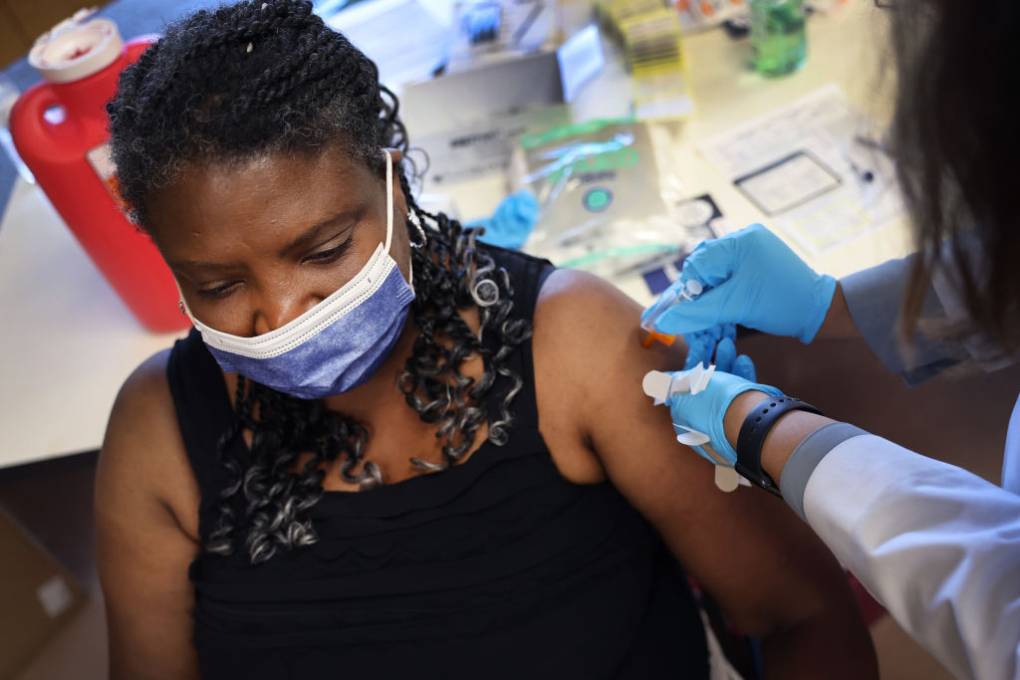Updated 11 a.m. Wednesday, September 21
Even as the COVID-19 pandemic continues to claim lives across the country, the flu remains a potentially serious threat to your health.
Jump straight to:
- When should I get my flu shot?
- Can I get a COVID booster and my flu shot at the same time?
- Which flu shot should I get if I’m 65 and older, I’m pregnant, or I need a shot for my kids?
- Where can I get a flu shot, with or without insurance?
The Centers for Disease Control and Prevention estimates that, annually, the flu caused 140,000-710,000 hospitalizations and 12,000-52,000 deaths between 2010 and 2020. But the organization says that in the 2020-2021 flu season, only around half of adults got a flu shot.
Getting a flu vaccine can prevent you from getting sick with the flu, which is a draining, unpleasant experience even if your symptoms are not severe. And if you do get the flu, having a flu shot can also stop you from getting sick enough to have to go to the hospital (and be exposed to all the COVID risks hospital settings can bring).
The CDC says the flu vaccine also offers other potential health impacts, such as being associated with lower rates of certain cardiac events for people who have heart disease. It’s also the best, safest way not only to protect yourself against the influenza virus, but also to minimize the chance you will spread it to others — folks who could be at far higher risk for serious complications or even death if they were to become infected. Read more from the CDC about what the flu shot can do for you.
And read on to find out whether you should be getting your flu shot right now, and where to find free or low-cost flu shot options near you.
Will this flu season be bad?
It’s true that 2020 saw a record-low number of flu cases — most likely due to widespread mask-wearing, increased hygiene, social distancing and remote work and school.
Last year’s flu season also “didn’t surge in the numbers that people expected,” said UCSF professor of medicine Dr. Peter Chin-Hong — but “it did drag on for much longer.” Whereas a typical flu season peaks in February, Chin-Hong said that last year’s “went from October of 2021 to June of 2022 — so, a much longer tail than usually we would expect.”
So what about this winter’s flu risks? Chin-Hong said he and other medical professionals are “worried for several reasons.”
Along with the lifting of COVID restrictions, there’s the fact that Australia has just had its worst flu season in five years. Because the continent’s winter happens during the United States’ summer, Australia’s flu season is traditionally an indicator of how bad ours might be — and, of concern, it was as “robust as any of the pre-pandemic flu seasons,” said Chin-Hong.
Dr. Michael Kim, vice president of medical affairs for MarinHealth, echoes these particular worries in the context of the lifting of COVID safety measures.
“I think we’re all concerned that flu season this year might be particularly severe, especially since people are not masking as much, as well as people haven’t been exposed to flu as much in the last couple of years,” said Kim.
Should I get a flu shot now, or wait?
The recommendations medical professionals make about when to get a flu shot are based on the fact that it takes about two weeks after you get vaccinated for antibodies to develop and provide protection against the flu.
This flu season, the CDC says that September and October are “generally good times to be vaccinated against flu,” and that “ideally, everyone should be vaccinated by the end of October.”

Yes, there’s evidence, says Chin-Hong, that your risk of getting the flu increases every month after your flu shot, due to the antibodies waning over time.
But when medical professionals talk about strategically “waiting” to get a flu shot, they’re aiming that advice at those who are at particularly high risk for more serious complications related to the flu. That includes people over 65, those with chronic medical conditions, people who are pregnant or planning a pregnancy, and kids under 5.
Delaying inoculations for these populations is based on the idea of getting the shot at a time Chin-Hong calls “the sweet spot,” around mid-to-late October. Two weeks later, right around early November, the antibodies should have developed, just as flu season is getting serious. Think of it as getting the “biggest bang for your buck,” he said.
So if you’re in one of those vulnerable categories? Yes, you can think about waiting, says Chin-Hong. People over 65 might also consider requesting the special flu vaccines for this age group — read more about this below. As with all health matters, if you’re looking for advice, it’s best to consult your health care provider or someone you see regularly for your medical needs.
And what if you’re under 65, not pregnant and don’t have other risk factors for severe flu? If you can truly trust yourself to plan ahead and not forget to make the appointment, “getting it before the end of October is probably the best,” said Chin-Hong. But remember: Not only are you human and it might slip your mind, but predictions about how the flu season might behave are just that — predictions. The timing of this year’s flu season might surprise us, and throw previous notions of a “best time” to get the vaccine into disarray.
“Just like we can’t predict the next COVID surge, we don’t know if influenza will have a different pattern this year,” said Chin-Hong, noting how Australia’s particularly bad flu season started earlier than expected. So take that “October rule” with “a grain of salt,” he advised, and “get it [your flu shot] when you get it.”
What if you plan to get your flu shot in October with the best of intentions, but you still forget? If November 1 comes and goes and you realize you haven’t been vaccinated, all is not lost — since the CDC says that “vaccination after October can still provide protection during the peak of flu season,” which is usually February.
In other words, just go get the shot already — whenever that may be.

Can I get my COVID booster and my flu shot at the same time?
Yes, you can. Ashish Jha, White House COVID response coordinator, went so far in a September 6 briefing as to tell the audience “I really believe this is why God gave us two arms — one for the flu shot and the other one for the COVID shot.”
That “COVID shot” is the newly available COVID booster — that is, the new Moderna and Pfizer booster shots of the reformulated COVID-19 vaccine. The updated shots, called bivalent vaccines, target both the original strain of the coronavirus and the widespread BA.4/BA.5 omicron subvariants that have largely evaded previous boosters.
Anyone age 12 and up who got their last COVID vaccine shot at least two months ago — whether that was their primary vaccination series or their last booster shot — can now get an updated COVID booster. Read more about how to find an updated COVID booster near you.
The CDC confirms that it’s safe to get both the flu shot and the bivalent COVID booster at the same time “if you are eligible and the timing coincides.” Several pharmacy chains are prompting those making an online appointment for a bivalent COVID booster to also “add on” a flu shot at the same time.
Getting both shots simultaneously certainly offers you convenience, said Chin-Hong: “It’s one-stop shopping and again: out of sight, out of mind.”
The only thing that might give you pause about getting your COVID bivalent booster and your flu shot: If you want to get your booster ASAP, some experts believe that it might be slightly too early right now to get your flu shot, considering how immunity from the vaccine wanes. That said, other medical professionals say that the benefits of folks remembering to actually get both their booster and their flu shot probably outweigh the downsides, even if it means the timing of their flu vaccine is a little early.
Chin-Hong reiterated that “if you really wanted to optimize” the timing of your flu shot, yes, “sometime in October is probably the best.” But ultimately, he says that just getting the shots is better than not getting them at all.
If I have risk factors for severe flu, what kind of flu shot should I get?
If you’re age 65 or older, there’s something new for you to know this flu season: There are now three types of flu vaccines it’s recommended you get, because they’ll be even more effective for you than a regular flu shot.
Chin-Hong said folks in this age group should seek out these three types of vaccines because you’ll be getting “essentially a high-dose shot” or a vaccine that contains an “adjuvant” — which, in simple terms, “makes the flu shot more powerful in terms of waking up the immune system,” he said. Read more about the three kinds of flu shots available to people age 65 and older.
Pregnant people can get a regular flu shot, although there are some types of flu vaccine that are off-limits to pregnant people. The CDC says that getting vaccinated when you’re pregnant will not only help protect you from the flu, but also — if your baby is born during the immunity period — protect your infant in the first few months of their life, when they’re too young to get vaccinated themselves.
This benefit to the baby is also the reason that pregnant people are one of the few groups who might want to consider getting a flu shot early, instead of waiting — to ensure their baby isn’t left completely unprotected for those first six months after birth, when they can’t get a vaccine. Read more about the benefits of getting a flu shot if you’re pregnant.
Children age 6 months and older can get a regular dose of the flu shot. Flu can be particularly dangerous for kids, and the CDC says that a 2022 study showed that flu vaccination reduced children’s risk of severe, life-threatening influenza by 75%.
Where can I get a flu shot if I have insurance?
If you have health insurance, a flu shot is available without extra cost as a preventive service from your usual health care provider, or at most pharmacies (see below).
It’s a good idea to wear a mask, maintain social distancing wherever possible while waiting for your shot, and dress in a top with sleeves you can easily pull up to your shoulder, to make receiving the injection even easier (and quicker).
Common places to find a flu shot appointment, walk-in site or drive-thru flu shot:
- CDC’s Find Flu Vaccines tool
- Kaiser Permanente flu shots (Northern California)
- CVS flu shots
- Walgreens flu shots
- Rite Aid flu shots
- Costco Pharmacy flu shots
- Albertsons (Safeway) flu shots
Where can I get a flu shot if I don’t have health insurance?
If you want a flu shot but don’t have health insurance, you can get the vaccine free of charge from several providers and community clinics around the Bay Area. (You can also technically use these free services even if you do have insurance, but you may consider choosing to free up these particular resources for those who are not covered.)
Your county’s own public health department may also be offering flu shots.
Places to get a free or low-cost flu shot in the Bay Area include:
- San Francisco Department of Public Health’s AITC clinic (offers a pay-what-you-can option, and says nobody will be refused for inability to pay)
- Contra Costa Public Health Immunization Clinic (flu shots are $15 for adults over 19, but fees may be waived if you’re unable to pay)
- Alameda County Immunization Clinics
